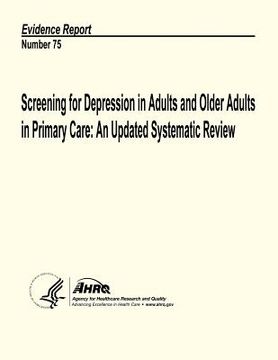Screening for Depression in Adults and Older Adults in Primary Care: An Updated Systematic Review: Evidence Report Number 75
Synopsis "Screening for Depression in Adults and Older Adults in Primary Care: An Updated Systematic Review: Evidence Report Number 75"
The term "depression" is not a specific term for a single diagnostic condition. Depressive disorders generally consist of major depressive disorder (MDD), dysthymia, and minor depression, but not other conditions that include depressive features, such as bipolar disorder. MDD is the most serious diagnosis, and is given to a person who meets criteria for major depressive disorder without manic or hypomanic features or a psychotic disorder. Dysthymia is similar to MDD but is generally longer-lasting and less severe. A variety of terms are used for people with depressive symptoms but whose depression does not meet criteria for MDD or dysthymia, such as subthreshold depression, subsyndromal depression, and minor depression. We conducted this review to aid the U.S. Preventive Services Task Force in updating its 2002 recommendation for adult depression screening in primary care. We focused on gaps in evidence identified by the previous review and on integrating relevant research published in the interim. We updated direct evidence that primary care depression screening programs improve health outcomes and examined evidence for the efficacy of depression treatment in older adults and evidence for the harms of screening and adverse events from antidepressant treatment in adults and older adults. Depression is a chronic disease characterized by partial remissions and recurrences in most of those who recover fully. While depression can occur in people of any age, the average age of onset is in the mid-twenties. Individuals are at risk for depression across their entire adult life span. Consistently identified high-risk groups include: women; people with other psychiatric disorders, including substance misuse; people with a family history of depression; people with chronic medical diseases; and people who are unemployed or with lower socio-economic status. While the prevalence of MDD is lower in community-dwelling older adults than in younger adults, significant depressive symptomatology is associated with common life events in older adults, including medical illness, cognitive decline, bereavement, and institutional placement in residential or inpatient settings. Although MDD is somewhat less prevalent in older adults, depression is a significant public health issue is this age group. Older adults have the highest risk of suicide of all age groups. Depression can be particularly difficult to identify in older patients, and much of the burden of depression diagnosis will fall to primary care providers. Diagnosis is complicated because medical conditions or medications can cause symptoms of depression, such as weight loss or appetite change, psychomotor retardation, loss of energy or fatigue, insomnia or hypersomnia, and difficulty concentrating. Further, the depressive symptoms of depressed mood and feelings of guilt tend to be less prominent in older depressed patients, whose primary complaints tend to be somatic. Depression in older adults is further complicated by the high levels of co-morbidity with medical conditions, including cancer, cardiovascular disease, neurological disorders, metabolic disturbances, arthritis, and sensory loss. Key Questions presented in this report include: KQ1: Is there direct evidence that screening for depression among adults and older adults in primary care reduces morbidity and/or mortality? KQ1a: What is the impact of clinician feedback of screening test results on depression response and remission in screen-detected depressed patients receiving primary care? KQ2: What are the harms of screening for depressive disorders in adults and older adults? KQ 3: Is antidepressant and/or psychotherapy treatment of older depressed adults effective in improving health outcomes? KQ4: What are the adverse effects of antidepressant treatment for depression in adults and older adults?

